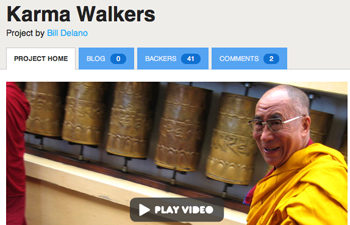According to the crowdfunding pitch for the film “Art Machine,” a $1 donation will buy you “love and respect from the cast and crew.” And if you give $1,000, you get perks like a DVD and a speaking role in the film. That’s the promise from director Doug Karr and Chop Wood Carry Water Productions for anyone who supported his film, which raised more than $26,000 using Kickstarter.
Two startups, Kickstarter and IndieGoGo, have jumpstarted online crowdfunding for filmmakers. Kickstarter describes itself as “a new way to fund and follow creativity,” while IndieGoGo says that it’s “a collaborative way to fund ideas.” A mix of the two taglines defines crowdfunding, allowing the audience to fund films with small donations.
I spoke with Kickstarter co-founder Yancey Strickler and received feedback from IndieGoGo CEO and co-funder Slava Rubin about crowdfunding, their respective sites and how filmmakers can effectively raise funds and awareness through them.
The Crowdfunding Comparison
Strickler called Kickstarter a flexible tool and resource for filmmakers that, thanks to its integration with social networks, is “an easy way to aggregrate all the love and support that a filmmaker has in the world.” Kickstarter aims to be “a place for artists to build a community” and where filmmakers “get to control what success is and talk to their audience the way they want to.”
Kickstarter’s supporting film role:
- A total of $6 million has been raised for film projects since April 2009
- More than a dozen filmmakers have successfully raised $40,000 (the maximum individual donation is $10,000)
- 2,500 film projects have been supported so far
- 45 percent of filmmakers successfully reach their funding goal
- What Kickstarter gets: a 5 percent, one-time fee
- Filmmakers only receive their funds if they reach the set goal
IndieGoGo calls its crowdfunding approach as “Do It With Others” (DIWO) fundraising, giving any ideathe tools and process to raise money, offer perks and keep 100 percent ownership. Rubin said that filmmakers on the site “range from Sundance award winners to college students making their first film.”
IndieGoGo’s supporting film role:
- Hundreds of new film projects are launched on the site each month
- One film was able to raise more than $70,000
- The “sweet spot” for films raising funds on the site is between $2,000 and $13,000
- The average funding contribution is $84
- What IndieGoGo gets: 4 percent fee if filmmakers reach their goals or a 9 percent fee if they don’t
- Filmmakers are able to keep the funds even if they don’t achieve their goals
Both sites have grown more than 400 percent over the past year, while Kickstarter has attracted seven times the number of unique monthly visitors as IndieGoGo. Kickstarter also has doubled site traffic in the past six months, according to Compete.com.
Perks for Pledges
Both Kickstarter and IndieGoGo give filmmakers the freedom to add incentives to encourage various levels of contributions and a larger number of funders. “With a good pitch, proactive marketing, and some cool perks, it’s amazing the support the film campaigns have been getting,” Rubin said.
Strickler highlighted three categories that filmmakers should consider when offering perks or rewards for participating in the funding process:
- A token of recognition: A credit or some form of acknowledgment that the funder is part of the project
- Physical products: DVDs or props from the film, for example
- Creative experiences: Participatory opportunities such as watching the dailies, meeting the director, attending the premiere or even having a role in the film
For film enthusiasts interested in funding projects, the opportunity to play a pivotal role in the production and post-production processes can be a reward in itself. On the other hand, filmmaker Bill Delano will actually give you a prayer flag blessed by a guide named Karma, for a pledge of $300 to support his “Karma Walkers” film.
Karr, the writer and director for the Chop Wood Carry Water Productions film “Art Machine,” used Kickstarter to raise “an eighth of the production budget” because “it seemed like the perfect mix of crowdsourcing, marketing and fundraising.”
“I can’t emphasize strongly enough how palpable the mix of awareness-raising tied with people helping to get the film made with even just a few dollars,” he said. “It’s really a fantastic way to open up the whole process.”
Nick Mendoza is the director of digital communications at Zeno Group. He advises consumer, entertainment and web companies on digital and social media engagement. He dreamstreams and is the film correspondent for MediaShift. Follow him on Twitter @NickMendoza.

